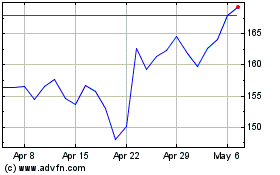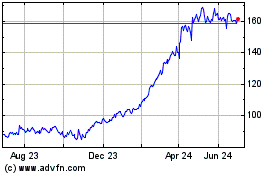GE Shows What Happens When Dividend Investing Goes Wrong
November 01 2018 - 2:39PM
Dow Jones News
By James Mackintosh
If you invested in General Electric for the dividend, you
discovered your mistake on Tuesday when the payout was slashed from
12 cents to 1 cent a share each quarter. You were in good company
in your error: Investors focus far too much on dividends,
distorting corporate behavior and making it easy to forget that
what matters isn't the payout, but whether the business can sustain
it.
GE cut the dividend because it needs to hoard cash as it
restructures and shrinks. Yet, even the token penny payout is a
sign of the distortions the demand for dividends creates. The
decision to maintain it is clearly down to the excessive value
shareholders place on dividends.
There were plenty of warning signs that the dividend was
unaffordable. Dividends are a way to return profits to
shareholders, but GE's net income has been higher than the dividend
cost in only four of the past 15 quarters -- compared with all but
two quarters in the entire period from 1989 to Lehman's failure in
2008.
Even excluding this week's monster $22.8 billion loss, GE has
paid out almost twice as much in dividends since 2012 as it made in
net income. Every shareholder should have realized that the
dividend was getting riskier, even if they weren't looking at the
falling amount of cash the business was producing.
In parallel, GE slashed its capital spending from $15 billion in
2012 to about $8 billion over the past 12 months, taking it back to
where it stood in 1998 -- before inflation. The business has been
eating its seed corn recently, partly to maintain the dividend.
Dividends do, of course, matter. The prospect of eventual future
dividends is the main reason shares have any value at all. Their
reinvestment has accounted for the bulk of long-term returns on
stocks. Better still, dividends can instill discipline on
executives, preventing them from indulging their wildest flights of
fancy by reminding them that they have to generate the cash to pay
stockholders. Chief executives given a free rein and plenty of
money have an unfortunate tendency to engage in value-destroying
takeovers, build fancy new headquarters and diversify into trendy
new businesses about which they know little. Better to pay
dividends or buy back shares than fritter the money away.
However, dividends should be the result of a successful business
throwing off cash, not something that executives strive to maintain
even when the cash could better be used elsewhere. GE is a classic
case of the dividend being prioritized in the hope that something
comes up.
For the major oil companies, something did come up, making it
look as though steady dividends could be justified. Consider Royal
Dutch Shell, the Anglo-Dutch oil company that is among the world's
most reliable dividend payers. It resorted to borrowing to pay its
dividend in 2015 and 2016 as it was hammered by the oil-price
slump, with earnings below the cost of the dividend for six
quarters in a row.
To save cash Shell offered investors the option to take their
dividend in the form of new shares, and like GE it and other oil
companies took an ax to capital spending. Unlike GE, Shell was
rescued by the oil-price recovery, and is now generating enough
cash both to pay the dividend and to buy back the shares it
issued.
Shareholders like the regular Shell dividend, and can argue that
Shell was right to keep paying it, since it all worked out OK. But
even here it would have been less risky for the company and its
long-term value had it scrapped the dividend when trouble hit, and
borrowed less. Investors who need cash should sell some of their
shares (for some of the smallest investors trading costs might be a
bar, but at $10 a trade this is irrelevant for most). Instead,
their irrational attachment to steady payments pushes companies to
borrow and to cut back the business in bad times to maintain the
payment.
Those eagerly anticipating their next dividend check might be
spluttering into their latte in horror at these views. But whether
the dividend is paid out or not should make no difference to them.
Shareholders own the company. When it pays out money to
shareholders, it is worth less -- by precisely the amount of the
dividend. The shareholder's pocketbook is unchanged. Somehow
investors still fail to notice this.
In an ideal world, companies would pay out cash when they have
no good uses for it, and invest it in new projects only when
justified by expected future profits. In an ideal world,
shareholders would trust the board's judgment, and executives
wouldn't be swayed by the latest fashions. In reality shareholders
swing from encouraging massive overinvestment to demanding all cash
be returned (now!) while managers frequently ignore solid projects
to game some ratio currently in vogue with Wall Street, or set out
on empire-building projects to boost their egos.
Demanding a solid dividend has merit as a way to limit
empire-building, but investors should beware companies that make it
a target to be met at all costs. Shareholders need to keep an eye
on much more than the quarterly payout to avoid their investments
going the way of GE.
Write to James Mackintosh at James.Mackintosh@wsj.com
(END) Dow Jones Newswires
November 01, 2018 14:24 ET (18:24 GMT)
Copyright (c) 2018 Dow Jones & Company, Inc.
GE Aerospace (NYSE:GE)
Historical Stock Chart
From Mar 2024 to Apr 2024

GE Aerospace (NYSE:GE)
Historical Stock Chart
From Apr 2023 to Apr 2024
